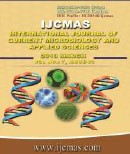


 National Academy of Agricultural Sciences (NAAS)
National Academy of Agricultural Sciences (NAAS)

|
PRINT ISSN : 2319-7692
Online ISSN : 2319-7706 Issues : 12 per year Publisher : Excellent Publishers Email : editorijcmas@gmail.com / submit@ijcmas.com Editor-in-chief: Dr.M.Prakash Index Copernicus ICV 2018: 95.39 NAAS RATING 2020: 5.38 |
This study was done to prepare a ration by supplement chandrasoor seeds and its performance in lactating animals then evaluate the effect of chandrasoor on the galactogogue activity in relation to milk yield and its major constituents. The entire feeding experiment was divided into three phases viz. Phase I, Phase II and Phase III and recorded the milk yield during the study. During Phase I, the cows in the respective groups were fed control rations namely - Tl, T2, T3, T4, T5 and T6 for a period of 7 days (control period). During Phase II, the cows under the respective groups were put on the formulated concentrate ration having chandrasoor seed content of 0, 100, 150, 200, 250 and 300 g in all treatments for the period of 7 days (treatment period). In Phase III, the cows under the respective groups were put again on control ration in all treatments rations for 45 days (residual period). During the experiment milk yield was recorded to observe the effect of chandrasoor containing ration on milk yield was highly significant i.e. 6.48, 6.62 and 7.20 liter/day in three phases of the study. Among all treatment T5 is an appropriate dose of chandrasoor seed in which about 11 per cent milk yield was increased as compared to control. It was also observed that T5 (250 g/day) chandrasoor seed dose was more suitable then the other doses because the quantity of milk was improved significantly. Therefore, it could be concluded that supplementing lactating cows feed with chandrasoor seed is recommended as a new step in improving productive performance of the lactating cows, regarding milk yield.
 |
 |
 |
 |
 |